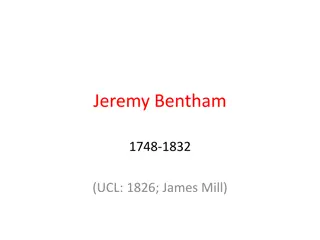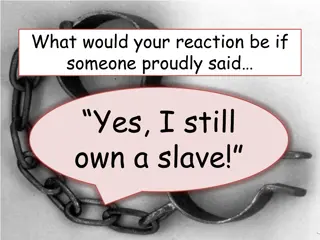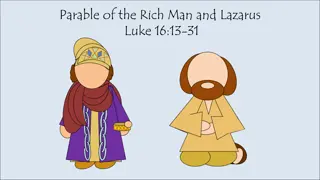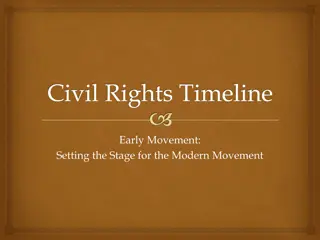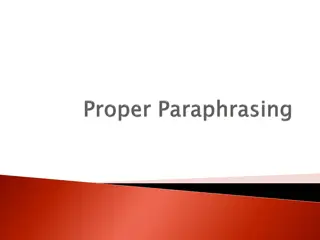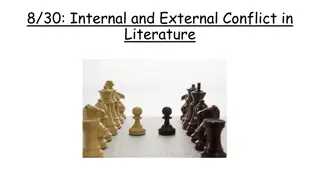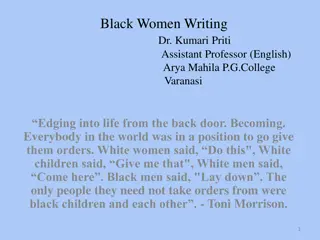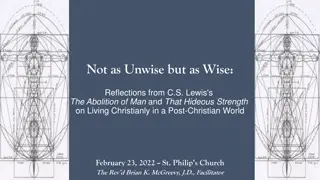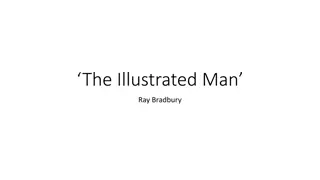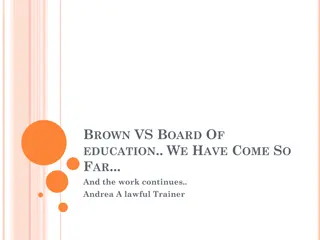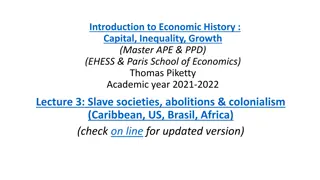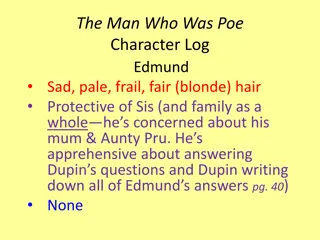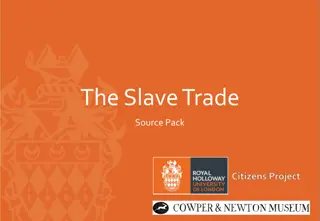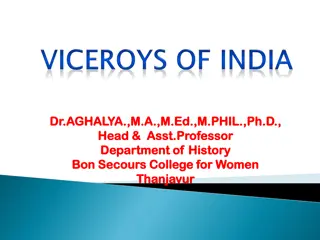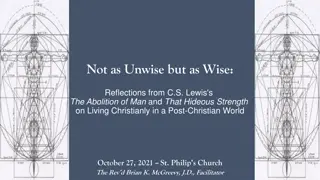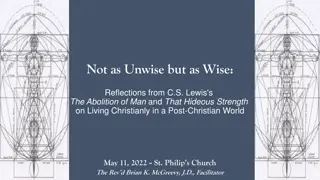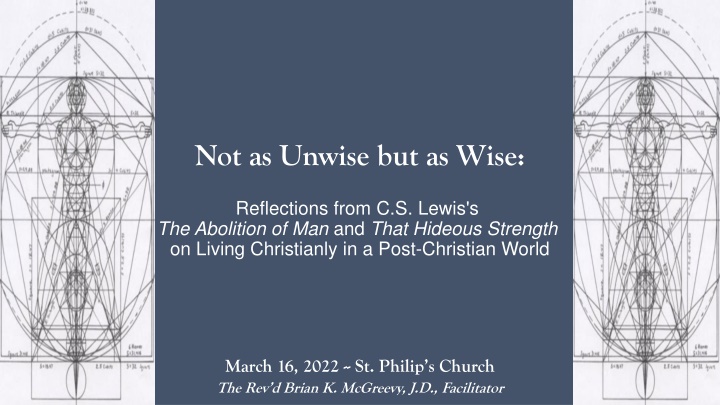
Reflections on Living Christianly in a Post-Christian World
Explore reflections from C.S. Lewis's works on living as a Christian in a post-Christian world, examining themes from 'The Abolition of Man' and 'That Hideous Strength'. Delve into the significance of light, wisdom, and discernment in Ephesians 5:8-17, while navigating through the Ransom Trilogy. Join St. Philip's Church for an insightful journey with Facilitator Rev. Brian K. McGreevy.
Download Presentation

Please find below an Image/Link to download the presentation.
The content on the website is provided AS IS for your information and personal use only. It may not be sold, licensed, or shared on other websites without obtaining consent from the author. If you encounter any issues during the download, it is possible that the publisher has removed the file from their server.
You are allowed to download the files provided on this website for personal or commercial use, subject to the condition that they are used lawfully. All files are the property of their respective owners.
The content on the website is provided AS IS for your information and personal use only. It may not be sold, licensed, or shared on other websites without obtaining consent from the author.
E N D
Presentation Transcript
Not as Unwise but as Wise: Reflections from C.S. Lewis's The Abolition of Man and That Hideous Strength on Living Christianly in a Post-Christian World March 16, 2022 -- St. Philip s Church The Rev d Brian K. McGreevy, J.D., Facilitator
For at one time you were darkness, but now you are light in the Lord. Walk as children of light (for the fruit of light is found in all that is good and right and true), and try to discern what is pleasing to the Lord. Take no part in the unfruitful works of darkness, but instead expose them. For it is shameful even to speak of the things that they do in secret. But when anything is exposed by the light, it becomes visible, for anything that becomes visible is light. Therefore it says, Awake, O sleeper, and arise from the dead, and Christ will shine on you. Look carefully then how you walk, not as unwise but as wise, making the best use of the time, because the days are evil. Therefore do not be foolish, but understand what the will of the Lord is. Ephesians 5: 8-17
How to approach this class: --On the beach --Snorkeling --Scuba diving --Email list How to read That Hideous Strength: --One chapter at a time --Make a chart of characters --Look for and note where themes from The Abolition of Man appear What we ll be doing each week: --Examining context and establishing a framework for appreciating these books --Unpacking the meaning of Lewis s works --Exploring their relevance for today --Considering how we can respond with practices of Hope and of Wisdom rooted in the Scriptures
REVIEW FROM PREVIOUS CLASSES Summary: Main theme of each chapter in The Abolition of Man 1. Men without Chests : The importance of objective values and the poison of subjectivism 2. The Way : Why the Tao, or Natural Law, is the sole source of all value judgments 3. The Abolition of Man : Man s control of Nature is in reality a means for some men (Conditioners) to control other men, using Nature as their instrument. To see through (deconstruct) all things is not to see at all. PLOT SUMMARY OF THE RANSOM TRILOGY Adapted from Taylor Dinerman, The Space Review -- Out of the Silent Planet, tells how Ransom, a Cambridge don on holiday, is kidnapped by the physicist Weston and his partner Devine, a sleazy businessman, and taken to Malacandra (Mars), supposedly as a human sacrifice. -- Perelandra, the name Lewis gives to Venus, is also the title of the second book in the series. Retelling the story of Adam and Eve, it is the most explicitly biblical of the three. Weston plays the role of the serpent sent to tempt the woman who is to become the mother of the world into rejecting God s will. Ransom is sent by the Oyarsa to challenge the evil one and to save Venus from the fate of Earth. -- That Hideous Strength combines a sordid tale of intra-university politics, Arthurian legend, and spiritual combat. In a small British University town, one of the colleges finds itself seduced and then engulfed by the newly established National Institute for Coordinated Experiments (N.I.C.E). This organization is secretly controlled by a pair of initiates, who plan to revive the wizard Merlin from his long, enchanted slumber and to use his powers for their own purposes. TITLE SOURCE The shadow of that hyddeous strength, sax myle and more it is of length (Sir David Lyndsay: from Ane Dialog, describing the Tower of Babel) This is a tall story about devilry, though it has behind it a serious point which I have tried to make in my Abolition of Man. from Preface to That Hideous Strength
REVIEW OF CHAPTER 1, SALE OF COLLEGE PROPERTY --Jane and her dreams --Mark and the Inner Circle at Bracton College --The proposal to sell Bragdon Wood and Merlin s Well to the N.I.C.E. --The Dimbles and rumors of Merlin REVIEW OF CHAPTER 2, DINNER WITH THE SUBWARDEN --Mark and being included in Feverstone s confidence in disdain of Curry and Busby --The N.I.C.E. as the ultimate Inner Circle/Ring , focused on taking over and reconditioning the human race, controlling and subduing Nature, and exerting control over the interplanetary wars --Jane s fears and vulnerability, which she later rejects as unworthy --Mark s journey to Belbury and Jane s journey to St. Anne s-on-the-Hill REVIEW OF CHAPTER 3, BELBURY AND ST. ANNE S-ON-THE-HILL --doublespeak at the N.I.C.E.: does Mark have a job or not? Bill Hingest leaving the N.I.C.E. --Jane s visit to St. Anne s and her denial and her aversion to being interfered with --Mark s introduction to Fairy Hardcastle and the role of the N.I.C.E. secret police --Jane s resentment of how much she has had to give up in marriage; Mother Dimble s crisis REVIEW OF CHAPTER 4, THE LIQUIDATION OF ANACHRONISMS --the N.I.C.E. begin turning people out of their homes and destroying Edgestow s beauty --Bill Hingest is murdered the night he leaves the N.I.C.E. --Mark has a strange conversation with the N.I.C.E. mad parson and is assigned a propaganda project on destroying the village of Cure Hardy, only to find he is moved by its beauty --the invasive force of workers from the N.I.C.E. results in partially destroying the beautiful Fellows Room at Bracton
REVIEW OF CHAPTER 5, ELASTICITY --Mark, frustrated by the doublespeak and lack of clarity at the N.I.C.E., attempts a showdown with Wither, the Deputy Director, that does not go well at all, and Mark fears he may not only lose his position at the N.I.C.E. but also his fellowship at Bracton College. --Fairy Hardcastle warns Mark about complaining and offers him project work writing propaganda to rehabilitate the image of Alcasan, the criminal murderer. It becomes clear that the N.I.C.E. intends to operate through threats and coercion. --Meanwhile, Jane spends time with Camilla and Arthur Denniston, learning that they now live at St. Anne's, a community run by Mr. Fisher-King, a renowned man incapacitated by a wounded heel. The Dennistons urge Jane to join their company and use her gift of visions to help them for the good of all, but she refuses, wishing to guard her independence. REVIEW OF CHAPTER 6, FOG --As fog envelops Edgestow and the N.I.C.E., Mark in desperation accepts a job at the N.I.C.E. working on propaganda. --Mark is admitted to the Inner Circle at the N.I.C.E., learning he can get whatever money he wants from the N.I.C.E. steward. He begins work on propaganda supporting the riots being instigated by the N.I.C.E., suppressing his initial shock and moral repugnance, to assist the N.I.C.E. in getting emergency powers to suppress liberties. --In the village, Jane sees the man with pince-nez glasses and a pointed beard whom she recognizes from her latest dream. When he gets into a N.I.C.E. car, she immediately decides to go to St. Anne's-on-the-Hill, feeling "a total rejection, or revulsion from, this man on all levels of her being at once. REVIEW OF CHAPTER 7, THE PENDRAGON --After fleeing the man in the pince nez from the N.I.C.E., Jane arrives at St. Anne s and is taken to see the Director. --Upon entering the Director s room, Jane s entire world was unmade, as she is swept away by the Beauty and Holiness and Kingliness of the Director and the house. --Trying to return home afterwards, Jane is caught up in a riot, arrested by the N.I.C.E. police, tortured by Fairy Hardcastle, and then escapes back to the Manor at St. Anne s.
REVIEW OF CHAPTER 8, MOONLIGHT AT BELBURY --Wither expresses his displeasure to Fairy Hardcastle about her arrest and torture of Jane Studdock and failure to prevent her escape. --Mark is in good spirits as everyone talks about how well the riots went and smugly enjoys that most don t know the articles written about it were his propaganda project. --Wither flatters Mark and encourages him to invite Jane out to join them, but Mark refuses, displeasing Wither. --Mark converses with Filostrato, who advocates getting rid of all organic life on earth and then tells Mark that the Head has survived death, and his brain lives on. He reveals the Head is Francois Alcasan, and then takes Mark to a lab-type room to meet the Head. SUMMARY OF CHAPTER 9, THE SARACEN S HEAD Jane tells her latest dream to Grace Ironwood and the Director. She saw a head floating before her - a face with a beard, nose, and eyes with colored glasses on. The top of its removed skull boiled over with a great mass as though something inside had boiled over. Then she realized the head did not actually float. It was fixed on something with rubber tubes, bulbs, and little metal things hanging below it, with the tubes going into a wall. It began an imitation of breathing, in a rhythmic - huff, huff, huff - and it dribbled at the mouth, but had no hands to wipe it. It worked its mouth and licked its lips, almost like a machine someone was getting into working order. Jane then saw three persons enter the room carefully, all dressed in white with masks. She recognized the third person as her husband, Mark. They bowed to the Head, and it spoke to them in French. One of the three seemed to introduce Mark to it. It said something to Mark, and Mark replied he would try to do something in a few days. Jane saw Mark get sick and collapse; she felt horror about the dream as she realized Mark's real surroundings and associates. The Director assures Jane they will try to rescue Mark. Meanwhile, Mark resolved he must bring Jane to Belbury, not for the purposes the N.I.C.E. had in mind, but to save his life, which he now worries about after seeing the Head artificially kept alive with air and saliva pumped from the adjoining
room. With his "modern" education, he has nothing else to fall back on but self-interest, though he does worry they would bring her to the Head if she came. Suddenly, Fairy Hardcastle appears and tries to convince Mark to sign a form which would allow the Fairy to bring Jane immediately to him at Belbury. She argues otherwise Jane might be sent to an Asylum for accusing the Fairy of burning her with cigarettes. Mark decides to go home at once to talk with Jane and tries to see Wither to report his decision. He bursts into Wither s office but finds him in a trance-like mostly unresponsive state. Mark attempts to flee, but then finds Wither blocking his path on the border of the property, so he returns to Belbury. Back at St. Anne's, MacPhee (the resident skeptic) invites Jane into "his little room" to explain more about the Company. He says the Director is actually Ransom, the famous philologist, and that he had been to Mars, where he met eldils on Mars. These beings live in empty space and alight on planets like birds on trees.The eldils explain that Earth is in danger because its eldils have turned to the dark side to form a conspiracy against the human race. MacPhee skeptically relates that the Director claims to continuously receive communications from the eldils about this plot. Later, Camilla tells Jane that the Director s youthful appearance results from his time on Perelandra (Venus), where Paradise still goes on, and those who return from there never age, never die but instead move on to Deep Heaven. She reveals him as the Pendragon of Logres. Later, the Director holds Council with those at St. Anne s, stating that that Jane's dreams reveal that the N.I.C.E. have discovered a way of making themselves immortal, which they will call the next step in Evolution. MacPhee wants the Director to act, but the Director says he acts under the directions of the eldils, who somehow brought them all together, and will reveal their plan in their good time. They then discuss why the N.I.C.E. wanted Bragdon Wood, realizing it has something to do with the Arthurian legends about where Merlin was buried. The Director believes that the N.I.C.E. wants to join Merlin s ancient powers to its modern powers, but says Merlin s powers were not exactly magical, but somehow more profound than the powers we possess in the modern world, deriving from Numinor (which ties Lewis' world to Tolkien's, as well as to the Atlantis' legends). The N.I.C.E. hopes to use these combined powers to subjugate the Earth and the entire human race.
Logres is King Arthurs realm in the Matter of Britain, the body of medieval literature and legendary material associated with Great Britain and Brittany. It derives from the medieval Welsh word Lloegyr, a name referring to South and Eastern England. In Arthurian contexts, "Logres" is often used to describe territory of the ancient Britons corresponding to the borders of England before the area was taken by the Anglo-Saxons after they began invading in the 5th century. According to Geoffrey of Monmouth s influential 12th century pseudohistory Historia Regum Britanniae, the realm was named after the legendary king Locrinus, the oldest son of Brutus of Troy. Geoffrey uses the word "Loegria" to describe a province containing most of England excluding Cornwall and possibly Northumberland. It was described by Chr tien de Troyes in the 12th century as "The Land of Ogres" in his poem Perceval, the Story of the Grail. In various French works, Logres appears as the name of the land or the capital city (otherwise Camelot). Translating and compiling such texts for his Le Morte d'Arthur, Thomas Malory conflated Logres with his contemporary Kingdom of England and usually used just "England" instead, except for the names of some of the Knights of the Round Table. In some medieval works, Logres is the personal domain of Gawain. Logres stands for the ideal and virtuous early Christian true England described in Arthurian myths and tales of the Holy Grail.
KEY PASSAGES FROM CHAPTER 9 I dreamed I was in a dark room, said Jane, with queer smells in it and a sort of low humming noise. Then the light came on but not very much light, and for a long time I didn t realise what I was looking at. And when I made it out I thought I saw a face floating in front of me. A face, not a head, if you understand what I mean. That is, there was a beard and nose and eyes at least, you couldn t see the eyes because it had coloured glasses on, but there didn t seem to be anything above the eyes. Not at first; But as I got used to the light, I got a horrible shock. I thought the face was a mask tied on to a kind of balloon thing. But it wasn t, exactly. Perhaps it looked a bit like a man wearing a sort of turban I m telling this dreadfully badly. What it really was, was a head (the rest of a head) which had had the top part of the skull taken off and then then as if something inside had boiled over. A great big mass which bulged out from inside what was left of the skull. Wrapped in some kind of composition stuff, but very thin stuff. You could see it twitch. Even in my fright I remember thinking, Oh kill it, kill it Put it out of its pain. But only for a second because I thought the thing was real, really. It was green looking and the mouth was wide open and quite dry And soon I saw that it wasn t exactly floating. It was fixed up on some kind of bracket, or shelf, or pedestal I don t know quite what, and there were things hanging from it. From the neck, I mean. Yes, it had a neck and a sort of collar thing round it, but nothing below the collar; no shoulders or body. Only these hanging things. In the dream I thought it was some kind of new man that had only head and entrails: I thought all those tubes were its insides. But presently I don t quite know how, I saw that they were artificial. Little rubber tubes and bulbs and little metal things too. I couldn t understand them. All the tubes went into the wall Well, quite suddenly, like when an engine is started, there came a puff of air out of its mouth, with a hard dry rasping sound. And then there came another, and it settled down into a sort of rhythm huff, huff, huff like an imitation of breathing. Then came a most horrible thing: the mouth began to dribble. I know it sounds silly but in a way I felt sorry for it because it had no hands and couldn t wipe its mouth. It seems a small thing compared with all the rest but that is how I felt. Then it began working its mouth about and even licking its lips. It was like someone getting a machine into working order. To see it doing that just as if it was alive, and at the same time dribbling over the beard which was all stiff and dead looking usurping the role of God with life and death, men without chests
Then three people came into the room, all dressed up in white, with masks on, walking as carefully as cats on the top of a wall. One was a great fat man, and another was lanky and bony. The third here Jane paused involuntarily. The third I think it was Mark I mean my husband. And then, said Jane, all three of them came round and stood in front of the Head. They bowed to it. You couldn t tell if it was looking at them because of its dark glasses. It kept on with that rhythmical huffing noise. Then it spoke. blasphemy, false worship Yes. Don t think hardly of him. He is suffering. If we are defeated we shall all go down with him. If we win we will rescue him; he cannot be far gone yet. He paused, smiled, and added, We are quite used to trouble about husbands here, you know. Poor Ivy s is in jail. In jail? Oh, yes for ordinary theft. But quite a good fellow Though Jane felt horror, even to the point of nausea, at the sight (in her dream) of Mark s real surroundings and associates, it had been horror that carried a certain grandeur and mystery with it. The sudden equation between his predicament and that of a common convict whipped the blood to her cheeks. compassion, redemption, equality at the foot of the Cross Mark woke next morning to the consciousness that his head ached all over but specially at the back. He remembered that he had fallen that was how he had hurt his head fallen in that other room, with Filostrato and Straik and then, as one of the poets says, he discovered in his mind an inflammation swollen and deformed, his memory. Oh, but impossible, not to be accepted for a moment: it had been a nightmare, it must be shoved away, it would vanish away now that he was fully awake. It was an absurdity. Once in delirium he had seen the front part of a horse, by itself, with no body or hind legs, running across a lawn, had felt it ridiculous at the very moment of seeing it, but not the less horrible for that. This was an absurdity of the same sort. A Head without any body underneath. A Head that could speak when they turned on the air and the artificial saliva with taps in the next room. His own head began to throb so hard that he had to stop thinking. But he knew it was true. And he could not, as they say, take it. He was very ashamed of this; the virtues he had almost succeeded in banishing from his mind still lived, if only negatively and as weaknesses, in his body. innate Horror of Evil
Meantime he must get up. He must do something about Jane. Apparently he would have to bring her to Belbury. His mind had made this decision for him at some moment he did not remember. He must get her, to save his life. All his anxieties about being in the Inner ring or getting a job had shrunk into insignificance. It was a question of life or death. They would kill him if he annoyed them; perhaps behead him oh God, if only they would really kill that monstrous little lump of torture, that lump with a face, which they kept there talking on its steel bracket. All the minor fears at Belbury for he knew now that all except the leaders were always afraid were only emanations from that central fear. He must get Jane; he wasn t fighting against that now. self-preservation, coercion, fear of death, sorting priorities It must be remembered that in Mark s mind hardly one rag of noble thought, either Christian or Pagan, had a secure lodging. His education had been neither scientific nor classical merely Modern. The severities both of abstraction and of high human tradition had passed him by: and he had neither peasant shrewdness nor aristocratic honour to help him. He was a man of straw, a glib examinee in subjects that require no exact knowledge and the first hint of a real threat to his bodily life knocked him sprawling. And his head ached so terribly and he felt so sick. Luckily he now kept a bottle of whisky in his room. A stiff one enabled him to shave and dress. miseducation=defenselessness, self-medication Don t he rude, honey. I m doing all I can for you. It s only well, I thought she was behaving pretty oddly when I saw her. Mark well remembered his conversation with his wife on the morning he left for Belbury. A new stab of fear pierced him. Might not this detestable woman be speaking the truth? What did she say? he asked. If there is anything wrong with her in that way, said the Fairy, take my advice, Studdock, and have her over here at once. She ll be properly looked after here. You haven t yet told me what she said or did. I wouldn t like to have anyone belonging to me popped into Edgestow Asylum. Specially now that we re getting our emergency powers. They ll be using the ordinary patients experimentally, you know. Whereas if you ll just sign this form I ll run over after lunch and have her here this evening. Mark threw his pen on the desk. I shall do nothing of the sort. lies, emergency powers to abrogate liberties, loss of sacredness of body
Ive been trying to tell you but you dont let me. She kept on talking about someone whod broken into your flat or else met her at the station and burned her with cigars. Then, most unfortunately, she noticed my cheroot, and, if you please, she identified me with this imaginary persecutor. Of course after that I could do no good. I must go home at once, said Mark getting up. Here whoa! You can t do that, said the Fairy also rising. Can t go home? I ve bloody well got to, if all this is true. Don t be a fool, lovey, said Miss Hardcastle. Honest! I know what I m talking about. You re in a damn dangerous position already. You ll about do yourself in if you re absent without leave now. Send me. Sign the form. That s the sensible way to do it. lies, coercion, bureaucratic Evil Mark noticed that the door was not quite shut. He ventured to push it open a little further and saw the Deputy Director sitting inside with his back to the door. Excuse me, Sir, said Mark. Might I speak to you for a few minutes? There was no answer. Excuse me, Sir, said Mark in a louder voice, but the figure neither spoke nor moved. With some hesitation, Mark went into the room and walked around to the other side of the desk; but when he turned to look at Wither he caught his breath, for he thought he was looking into the face of a corpse. A moment later he recognised his mistake. In the stillness of the room he could hear the man breathing. He was not even asleep, for his eyes were open. He was not unconscious, for his eyes rested momentarily on Mark and then looked away. I beg your pardon, Sir, began Mark and then stopped. The Deputy Director was not listening. He was so far from listening that Mark felt an insane doubt whether he was there at all, whether the soul of the Deputy Director were not floating far away, spreading and dissipating itself like a gas through formless and lightless worlds, waste lands and lumber rooms of the universe. What looked out of those pale watery eyes was, in a sense, infinity the shapeless and the interminable. The room was still and cold: there was no clock and the fire had gone out. It was impossible to speak to a face like that Mark was afraid; it was so unlike any experience he had ever had before. When at last Mr. Wither spoke, his eyes were not fixed on Mark but on some remote point beyond him, beyond the window, perhaps in the sky. I know who it is, said Wither. Your name is Studdock. What do you mean by coming here? You had better have stayed outside. Go away. It was then that Mark s nerve suddenly broke. innate Horror of Evil
All the slowly mounting fears of the last few days ran together into one fixed determination and a few seconds later he was going downstairs three steps at a time. Then he was crossing the hall. Then he was out, and walking down the drive. Once again, his immediate course seemed quite plain to him. Opposite the entrance was a thick belt of trees pierced by a field path. That path would bring him in half an hour to Courthampton and there he could get a country bus to Edgestow. About the future he did not think at all. Only two things mattered: firstly, to get out of that house, and, secondly, to get back to Jane. He was devoured with a longing for Jane which was physical without being at all sensual: as if comfort and fortitude would flow from her body, as if her very skin would clean away all the filth that seemed to hang about him. He stopped suddenly. Something impossible was happening. There was a figure before him on the path: a tall, very tall, slightly stooping figure, sauntering and humming a little dreary tune: the Deputy Director himself. And in one moment all that brittle hardihood was gone from Mark s mood. He turned back. He stood in the road; this seemed to him the worst pain that he ever felt. Then, tired, so tired that he felt the weak tears filling his eyes, he walked very slowly back into Belbury. Evil, danger of being complicit, being captive I should premise at the outset, Mrs. Studdock, he said, that I have known the Director for a great many years and that for most of his life he was a philologist. I m not just satisfied myself that philology can be regarded as an exact science, but I mention the fact as a testimony to his general intellectual capacity. And, not to forejudge any issue, I will not say, as I would in ordinary conversation, that he has always been a man of what you might call an imaginative turn. His original name was Ransom. Ransom connotations But he also says he met one kind of creature there which specially concerns us at this moment. He called them eldils. A kind of animal, do you mean? Did ever you try to define the word Animal, Mrs. Studdock? Not that I remember. I meant, were these things well, intelligent? Could they talk? Aye. They could talk. They were intelligent, for-bye, which is not always the same thing. In fact, these were the Martians? That s just what they weren t according to his account. They were on Mars but they didn t rightly belong there. He says they are, creatures that live in empty space. reality of beings from spiritual world
The point, Mrs. Studdock, he said, is this: Dr. Ransom claims that he has received continual visits from these creatures since he returned to Earth. So much for his first disappearance. Then came the second. He was away for more than a year and that time he said he d been in the planet Venus taken there by these eldils. The long and short of it is that this house is dominated either by the creatures I m talking about or by a sheer delusion. It is by advices he thinks he has received from eldils that the Director has discovered the conspiracy against the human race; and what s more, it s on instructions from eldils that he s conducting the campaign if you can call it conducting! It may have occurred to you to wonder, Mrs. Studdock, how any man in his senses thinks we re going to defeat a powerful conspiracy by sitting here growing winter vegetables and training performing bears. It is a question I have propounded on more than one occasion. The answer is always the same; we re waiting for orders. From the eldils? It was they he meant when he spoke of his Masters?... it s not our own ones that the Director claims to be in communication with. It s his friends from Outer Space. Our own crew, the terrestrial eldils, are at the back of the whole conspiracy. You are to imagine us, Mrs. Studdock, living on a world where the criminal classes of the eldils have established their headquarters. And what s happening now, if the Director s views are correct, is that their own respectable kith and kin are visiting this planet to red the place up. You mean that the other eldils out of space actually come here to this house? That is what the Director thinks. spiritual guidance, spiritual warfare, difference from worldly wisdom and weapons They ll have all this country under their hands before we move, at this rate. I wish you d read the poem I m reading, said Camilla. For it says in one line just what I feel about this waiting: Fool, All lies in a passion of patience, my lord s rule. What s that from? asked Jane. Taliessin through Logres. waiting on the Lord, Arthurian wisdom You mean his looking er being so young if you call it young? Yes. That is what people are like who come back from the stars. Or at least from Perelandra. Paradise is still going on there; make him tell you about it some time. He will never grow a year or a month older again. Zoe life of Deep Heaven, unfallen Creation
He will be taken away, I believe. Back into Deep Heaven. It has happened to one or two people, perhaps about six, since the world began. he is the Pendragon of Logres. This house, all of us here, and Mr. Bultitude and Pinch, are all that s left of the Logres: all the rest has become merely Britain. eternal life of Deep Heaven, Logres It tells us something in the long run even more important, said the Director. It means that if this technique is really successful, the Belbury people have for all practical purposes discovered a way of making themselves immortal. There was a moment s silence, and then he continued: It is the beginning of what is really a new species the Chosen Heads who never die. They will call it the next step in Evolution. And henceforward, all the creatures that you and I call human are mere candidates for admission to the new species or else its slaves perhaps its food. The emergence of the Bodiless Men! usurping God s role in life and death, men without chests Mr. Director, said MacPhee. You ll excuse me for speaking frankly. Your enemies have provided themselves with this Head. They have taken possession of Edgestow and they re in a fair way to suspend the laws of England. And still you tell us it is not time to move. If you had taken my advice six months ago we would have had an organisation all over this island by now and maybe a party in the House of Commons. I know well what you ll say that those are not the right methods. And maybe no. But if you can neither take our advice nor give us anything to do, what are we all sitting here for? Have you seriously considered sending us away and getting some other colleagues that you can work with? waiting on the Lord versus worldly wisdom and weapons I am the Director, said Ransom, smiling. Do you think I would claim the authority I do if the relation between us depended either on your choice or mine? You never chose me. I never chose you. Even the great Oyeresu whom I serve never chose me. I came into their worlds by what seemed, at first, a chance; as you came to me as the very animals in this house first came to it. You and I have not started or devised this: it has descended on us sucked us into itself, if you like. It is, no doubt, an organisation: but we are not the organisers. And that is why I have no authority to give any one of you permission to leave my household. Heavenly authority and plan
We knew already that the enemy wanted the Wood. Some of us guessed why. Now Jane has seen or rather felt in a vision what it is they are looking for in Bragdon. It may be the greater danger of the two. But what is certain is that the greatest danger of all is the junction of the enemies forces. He is staking everything on that. When the new power from Belbury joins up with the old power under Bragdon Wood, Logres indeed Man will be almost surrounded. For us everything turns on preventing that junction. That is the point at which we must be ready both to kill and die. But we cannot strike yet. We cannot get into Bragdon and start excavating for ourselves. There must be a moment when they find him it. I have no doubt we shall be told in one way or another. Till then we must wait. danger of worldly power allied with dark spiritual power Dimble and he and the Dennistons shared between them a knowledge of Arthurian Britain which orthodox scholarship will probably not reach for some centuries. They knew that Edgestow lay in what had been the very heart of ancient Logres, that the village of Cure Hardy preserved the name of Ozana le Coeur Hardi, and that a historical Merlin had once worked in what was now Bragdon Wood. What exactly he had done there they did not know; but they had all, by various routes, come too far either to consider his art mere legend and imposture, or to equate it exactly with what the Renaissance called Magic. Dimble even maintained that a good critic, by his sensibility alone, could detect the difference between the traces which the two things had left on literature. What common measure is there, he would ask, between ceremonial occultists like Faustus and Prospero and Archimago with their midnight studies, their forbidden books, their attendant fiends or elementals, and a figure like Merlin who seems to produce his results simply by being Merlin? And Ransom agreed. He thought that Merlin s art was the last survival of something older and different something brought to Western Europe after the fall of Numinor and going back to an era in which the general relations of mind and matter on this planet had been other than those we know. It had probably differed from Renaissance Magic profoundly. It had possibly (though this was doubtful) been less guilty: it had certainly been more effective The whole Renaissance outburst of forbidden arts had, it seemed, been a method of losing one s soul on singularly unfavourable terms. But the older Art had been a different proposition. Arthurian wisdom
But if the only possible attraction of Bragdon lay in its association with the last vestiges of Atlantean magic, this told the Company something else. It told them that the N.I.C.E., at its core, was not concerned solely with modern or materialistic forms of power. It told the Director, in fact, that there was eldilic energy and eldillc knowledge behind it. It was, of course, another question whether its human members knew of the dark powers who were their real organisers As Ransom himself had said more than once, Whether they know it or whether they don t, much the same sort of things are going to happen. It s not a question of how the Belbury people are going to act (the dark-eldils will see to that) but of how they will think about their actions. They ll go to Bragdon: it remains to be seen whether any of them will know the real reason why they re going there, or whether they ll all fudge up some theory of soils, or air, or etheric tensions, to explain it. There was no doubt in his mind now that the enemy had bought Bragdon to find Merlin: and if they found him they would re-awake him. The old Druid would inevitably cast his lot with the new planners what could prevent his doing so? A junction would be effected between two kinds of power which between them would determine the fate of our planet. Doubtless that had been the will of the dark eldils for centuries. The physical sciences, good and innocent in themselves, had already, even in Ransom s own time, begun to be warped, had been subtly manoeuvred in a certain direction. Despair of objective truth had been increasingly insinuated into the scientists; indifference to it, and a concentration upon mere power, had been the result. spiritual warfare, manipulation, corruption of science What should they find incredible, since they believed no longer in a rational universe? What should they as too obscene, since they held that all morality was a mere subjective by-product of the physical and economic situations of men? The time was ripe. From the point of view which is accepted in Hell, the whole history of our Earth had led up to this moment. There was now at last a real chance for fallen Man to shake off that limitation of his powers which mercy had imposed upon him as a protection from the full results of his fall. If this succeeded, Hell would be at last incarnate. Bad men, while still in the body, still crawling on this little globe, would enter that state which, heretofore, they had entered only after death, would have the diuturnity and power of evil spirits. Nature, all over the globe of Tellus, would become their slave; and of that dominion no end, before the end of time itself, could be certainly foreseen. end result of subjectivism, spiritual warfare, Babel and Hell on earth
THEMES THAT APPEAR IN CHAPTER 9 --usurping the role of God with life and death, men without chests blasphemy, false worship compassion, redemption, equality at the foot of the Cross innate Horror of Evil. power of self-preservation instinct, coercion, fear of death, sorting priorities miseducation = defenselessness against Evil, self-medication lies, emergency powers to abrogate liberties, loss of sacredness of body lies, coercion, bureaucratic Evil innate Horror of Evil Evil, danger of being complicit, becoming captive Ransom connotations reality of beings from spiritual world spiritual guidance, spiritual warfare, difference from worldly wisdom and weapons waiting on the Lord, Arthurianwisdom Zoe life of Deep Heaven, unfallen Creation eternal life of Deep Heaven, Logres usurping God s role in life and death, men without chests waiting on the Lord versus worldly wisdom and weapons Heavenly authority and plan danger of worldly power allied with dark spiritual power Arthurian wisdom spiritual warfare, manipulation, corruption of science end result of subjectivism, spiritual warfare, Babel and Hell on earth
Practices of Hope and of Wisdom Finally, brothers, whatever is true, whatever is honorable, whatever is just, whatever is pure, whatever is lovely, whatever is commendable, if there is any excellence, if there is anything worthy of praise, think about these things.What you have learnedand received and heard and seen in me practice these things, and the God of peace will be with you. Phil. 4:8-9 1. Deepen your understanding of the sacredness of the human body created by God. Do you not know that your body is a temple of the Holy Spirit within you, whom you have from God? You are not your own, for you were bought with a price. So glorify God in your body. (I Cor. 6:19-20) For you formed my inward parts; you knitted me together in my mother's womb. I praise you, for I am fearfully and wonderfully made.Wonderful are your works; my soul knows it very well. (Ps. 139:13-14) 2. Cultivate an understanding and practice of waiting on the Lord with patience, rather than embracing earthly wisdom. Wait for the Lord; be strong and take heart and wait for the Lord. (Ps. 27:14) Rejoice in hope, be patient in tribulation, be constant in prayer. (Romans 12:12) The Lord is not slow in keeping his promise, as some understand slowness. Instead he is patient with you, not wanting anyone to perish, but everyone to come to repentance.(2 Peter 3:9) 3. Be aware of the reality of spiritual warfare and seek to be strong in the Lord.Finally, be strong in the Lord and in the strength of his might. Put on the whole armor of God, that you may be able to stand against the schemes of the devil. For we do not wrestle against flesh and blood, but against the rulers, against the authorities, against the cosmic powers over this present darkness, against the spiritual forces of evil in the heavenly places. Therefore take up the whole armor of God, that you may be able to withstand in the evil day, and having done all, to stand firm. Stand therefore, having fastened on the belt of truth, and having put on the breastplate of righteousness, and, as shoes for your feet, having put on the readiness given by the gospel of peace. In all circumstances take up the shield of faith, with which you can extinguish all the flaming darts of the evil one;17and take the helmet of salvation, and the sword of the Spirit, which is the word of God, praying at all times in the Spirit, with all prayer and supplication. (Eph. 6:10-18) 4. Remember daily that your true life is the eternal life of the Kingdom of God. Set your minds on things that are above, not on things that are on earth. For you have died, and your life is hidden with Christ in God. When Christ who is your life appears, then you also will appear with him in glory. (Col. 3:2-4)
COME, MY WAY, MY TRUTH, MY LIFE --George Herbert, 1633 Come, my Way, my Truth, my Life: such a way as gives us breath; such a truth as ends all strife; such a life as killeth death. Come, my Light, my Feast, my Strength: such a light as shows a feast; such a feast as mends in length; such a strength as makes a guest. Come, my Joy, my Love, my Heart: such a joy as none can move: such a love as none can part; such a heart as joys in love.
For at one time you were darkness, but now you are light in the Lord. Walk as children of light (for the fruit of light is found in all that is good and right and true), and try to discern what is pleasing to the Lord. Take no part in the unfruitful works of darkness, but instead expose them. For it is shameful even to speak of the things that they do in secret. But when anything is exposed by the light, it becomes visible, for anything that becomes visible is light. Therefore it says, Awake, O sleeper, and arise from the dead, and Christ will shine on you. Look carefully then how you walk, not as unwise but as wise, making the best use of the time, because the days are evil. Therefore do not be foolish, but understand what the will of the Lord is. Ephesians 5: 8-17

